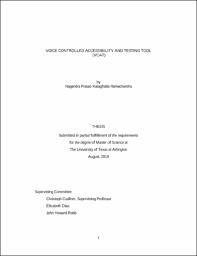
ATTENTION: The works hosted here are being migrated to a new repository that will consolidate resources, improve discoverability, and better show UTA's research impact on the global community. We will update authors as the migration progresses. Please see MavMatrix for more information.
Show simple item record
| dc.contributor.advisor | Csallner, Christoph | |
| dc.creator | Kasaghatta Ramachandra, Nagendra Prasad | |
| dc.date.accessioned | 2019-08-27T18:20:06Z | |
| dc.date.available | 2019-08-27T18:20:06Z | |
| dc.date.created | 2019-08 | |
| dc.date.issued | 2019-08-07 | |
| dc.date.submitted | August 2019 | |
| dc.identifier.uri | http://hdl.handle.net/10106/28592 | |
| dc.description.abstract | Most current browser-based web applications and software engineering tools, such as test generators and management tools, are not accessible to users who cannot use a traditional input device, such as a mouse and/or a keyboard. To address this shortcoming, this research leverages recent speech-recognition advances to create a chrome browser extension that interprets voice inputs as web browser commands and executes those commands within the browser. As a result, the Voice Controlled Accessibility and Testing tool (VCAT) leverages the Chrome browser to achieve higher accessibility, with the capability to perform webpage navigation using voice commands. The tool is also capable of programmatically generating Java Selenium test case source code from the given set of voice commands, which helps achieve faster test case generation, compared to traditional methods of writing Java Selenium source code. | |
| dc.format.mimetype | application/pdf | |
| dc.language.iso | en_US | |
| dc.subject | Accessibility | |
| dc.subject | Selenium Code generation | |
| dc.subject | Chrome browser extension | |
| dc.title | Voice Controlled Accessibility and Testing tool (VCAT) | |
| dc.type | Thesis | |
| dc.degree.department | Computer Science and Engineering | |
| dc.degree.name | Master of Science in Computer Science | |
| dc.date.updated | 2019-08-27T18:21:12Z | |
| thesis.degree.department | Computer Science and Engineering | |
| thesis.degree.grantor | The University of Texas at Arlington | |
| thesis.degree.level | Masters | |
| thesis.degree.name | Master of Science in Computer Science | |
| dc.type.material | text | |
| dc.creator.orcid | 0000-0002-0201-8154 | |
Files in this item
- Name:
- KASAGHATTARAMACHANDRA-THESIS-2 ...
- Size:
- 1.968Mb
- Format:
- PDF
This item appears in the following Collection(s)
Show simple item record


